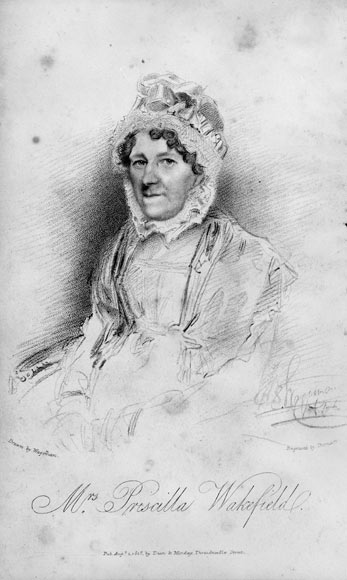Priscilla Wakefield

Credit: Ulrich Lange, Dunedin, New Zealand
| Giver: | Individual |
|---|---|
| Receiver: | - |
| Gift: | Other, Voice/Advocacy |
| Approach: | Philanthropy |
| Issues: | 4. Quality Education, 5. Gender Equality, 8. Decent Work and Economic Growth |
| Included in: | Philanthropy and Education, Social Activism |
Priscilla Wakefield (1751-1832) was a leading Quaker reformer, philanthropist and educator. She remains best known as the founder of the Tottenham Female Benefit Club, one of the first savings banks to provide financial services to low-income customers. Wakefield also earned renown as an advocate for women’s rights, particularly in the areas of work and education – efforts that played a small but vital role in shaping the early feminist movement.
Wakefield was born Priscilla Bell in Tottenham, U.K. She descended from a long line of eminent Quakers; Robert Barclay (1648-1690), the prominent theologian and author, was her great-grandfather. Well-educated at an early age, she developed a broad knowledge of science, history and politics, subjects that later inspired her passion for social reform. In 1771 she married Edward Wakefield, a London merchant. The couple had five children, three of whom survived into adulthood.
In the early 1790s Wakefield became active in philanthropic work. In 1791 she founded the Lying-In Charity for Women, which provided shelter and postnatal care for new mothers living in poverty. Her School of Industry, where young women received a basic education while learning practical domestic skills, followed a year later.
As her husband’s business ventures began to struggle, Wakefield turned to writing as a way to earn additional income. Her first published work, Juvenile Anecdotes, Founded on Facts, appeared in 1795. Among her most important educational texts, An Introduction to Botany , followed a year later. Written as an epistolary exchange between two sisters, the book provides practical guidance for children interested in studying the natural world and seeks to inspire young girls to pursue scientific knowledge that might otherwise remain inaccessible to them.
Wakefield’s most influential work, Reflections on the Present Condition of the Female Sex, appeared in 1798. The book arose in response to The Wealth of Nations (1776) by economist and moral philosopher Adam Smith (1723-1790). Wakefield focuses on Smith’s concept of productive labor – the idea that all able-bodied individuals have an ethical obligation to engage in work that benefits society – and applies it to the economic potential of women. In imagining a role for women outside of traditional domestic duties, Wakefield posits what Katherine Binhammer describes as “the new ideal of the rational, maternal, bourgeois, female citizen.”
Soon after the publication of her landmark treatise, Wakefield launched her Female Benefit Club – also known as a “frugality bank,” a phrase borrowed from utilitarian philosopher Jeremy Bentham (1748-1832). By accepting small deposits, Wakefield’s bank became the first institution where low-income laborers could invest their savings. A board of trustees invested these pooled funds in government bonds, which paid a return of 5% to the bank’s customers. The club became the basis for Wakefield’s Tottenham Savings Bank in 1804.
Wakefield died in Tottenham in 1832. Although largely overshadowed by early feminist thinkers like Mary Wollstonecraft (1759-1797), her work on behalf of women and low-income laborers has had a lasting impact on social reform movements today.
Contributor: Stephen Meyer
| Source type | Full citation | Link (DOI or URL) |
|---|---|---|
| Publication |
Binhammer, Katherine. “Thinking Gender with Sexuality in 1790s’ Feminist Thought.” Feminist Studies 28, no. 3 (Autumn 2002): 667-90. |
https://doi.org/10.2307/3178798 |
| Publication |
Dimand, Robert W., Evelyn L. Forget, and Chris Nyland. “Retrospectives: Gender in Classical Economics.” The Journal of Economic Perspectives 18, no. 1 (Winter 2004): 229-40. |
https://www.jstor.org/stable/3216883 |
| Publication |
Leach, Camilla, and Joyce Goodman. “Educating the Women of the Nation: Priscilla Wakefield and the Construction of National Identity, 1798.” Quaker Studies 5, no. 2 (2000): 165-82. |
https://digitalcommons.georgefox.edu/cgi/viewcontent.cgi?article=1187&context=quakerstudies |
| Publication |
Miller, P. J. “Women’s Education, ‘Self-Improvement’ and Social Mobility—A Late Eighteenth Century Debate.” British Journal of Educational Studies 20, no. 3 (October 1972): 302-14. |
https://doi.org/10.2307/3120775 |
| Book |
Wakefield, Priscilla. Reflections on the Present Condition of the Female Sex: With Suggestions for Its Improvement. Cambridge: Cambridge University Press, 2015. |
9781108084710 |